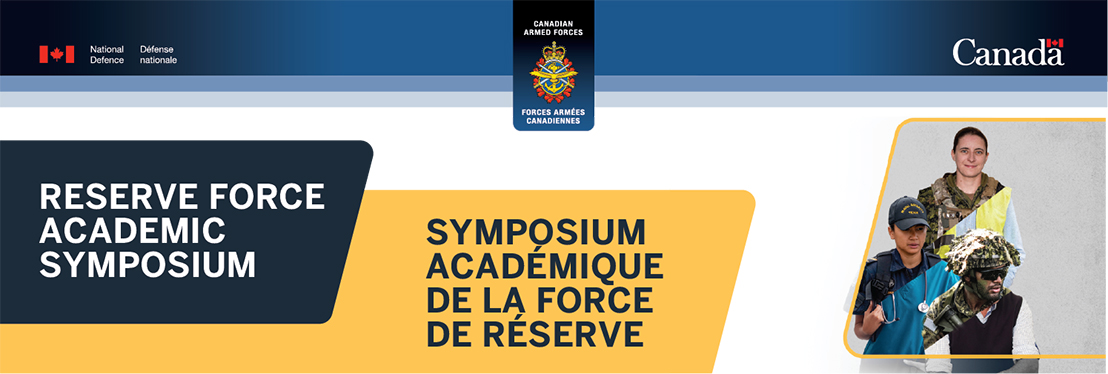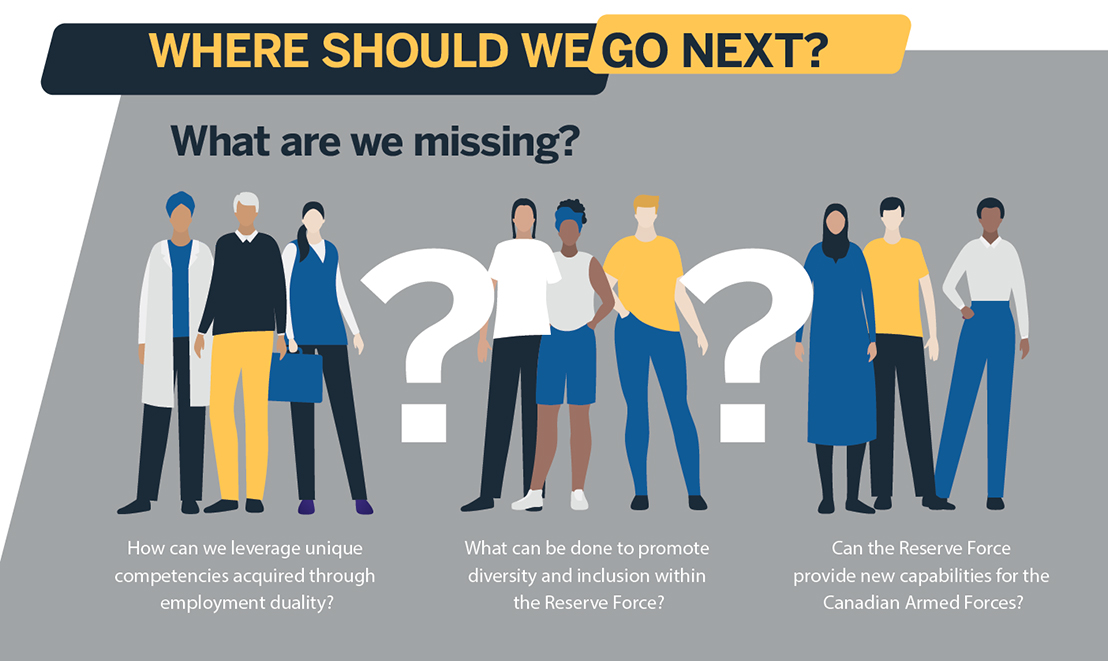2024 Academic Symposium: Opportunities for Canada’s Reserve Forces

Reserve Force Academic Symposium 2024
Chief of Reserves held the second annual Reserve Force Academic Symposium on Opportunities for Canada’s Reserve Forces in Gatineau on September 27, 2024.
Reserve Force Infographic [PDF]
Aim of the Reserve Force Academic Symposium 2024:
By inviting the academic community, government scientists and interested parties to a symposium dedicated to research on military issues, Canadians will benefit from the greater coordination of efforts, and the expanded capacity to perform much needed research. This collaboration will create a bridge between the academic and government research environments to ensure that conclusions drawn are of the utmost quality for our dedicated Reserve Force personnel.
Topic areas to achieve a stronger Reserve Force:
- Strategies for recruiting and retaining individuals to reserve forces, leveraging the unique competencies acquired through employment duality.
- Innovative approaches to promoting diversity and inclusion within reserve forces, including bilingualism, gender equality, representation of minority groups, and Indigenous peoples.
- Case studies and best practices highlighting successful initiatives in recruiting and retaining diverse reservists.
- Innovative concepts that explore the nexus between unique competencies and identity constructs of the reserve force and opportunities for new capabilities.
- The Role of the Reserve Force in the Implementation of the New Defence Strategy - Our North, Strong and Free: A Renewed Vision for Canada’s Defence.
Summary of recommendations

Caption
- Where should we go next?
- What are we missing?
- How can we leverage unique competencies acquired through employment duality?
- What can be done to promote diversity and inclusion within the Reserve Force?
- Can the Reserve Force provide new capabilities for the Canadian Armed Forces?
Flexible service, stronger support, and better use of civilian skills are not optional improvements; they are essential to building a modern and effective Reserve Force.
The following recommendations were made:
- The Canadian Armed Forces (CAF) needs to offer more flexible ways for people to serve. This means using the skills of both soldiers and civilians, and giving people different options for how long and how often they serve. Letting people help in ways that match their skills will make the military stronger. The CAF should expand the Reserve Force by making it more flexible and giving people more choices.
- To support the well-being of Primary Reserve members, the military should focus on better recruitment, stronger leadership training, and more awareness of support programs.
- A 2022 survey of Reserve Force members found:
- 56.4% said work demands affected their home life
- 37.1% had trouble attending duties because of civilian jobs,
- 51.0% were satisfied with training opportunities
- Top reasons for leaving included family needs (45.6%), lack of opportunities (31.8%), and job dissatisfaction (19.6%).
- More research is needed to improve how benefits are calculated for Reserve Force veterans. This includes collecting better data and understanding how service affects their income and families.
- The Supplementary Reserve should include civilian skills to support missions in Canada and help the military respond faster when needed.
Research presented
The following research was presented at the Reserve Force Academic Symposium 2024:
- Panel discussion: Moving to a Total Defence Force: Integrating CAF Regular and Reserve Forces.
Panel Chair: Irina Goldenberg, PhD; Director General Military Personnel Research and Analysis, Military Personnel Command.- Guardians of the north: Assessing the Canadian Defence Team concept.
Author: Howard G. Coombs, PhD; Royal Military College of Canada. - Employment equity as a strategic enabler.
Author: Patrick Kelly, MSM, CD; Planning Manager, DGMPRA, Department of National Defence. - Future Regular-Reserve integration.
Author: Michael Rostek, CD, PhD, APF; Defence Scientist, DGMPRA, Department of National Defence.
- Guardians of the north: Assessing the Canadian Defence Team concept.
- What reserve for the Canadian Army?
- Author: Col Richard Garon, PhD; Director CIMIC and PsyOps, Canadian Armed Forces.
- Assessing Veteran Affairs Canada’s research and its influence on income replacement policy for disabled Reserve Force veterans.
- Author: MGen (Ret’d) John Milne, MSM, CD, BSc, MA.
- The time is now for integrating formal evaluation of simulation training initiatives to effectively assess medical personnel’s competency in the Canadian Forces health services.
- Authors: Sarah Ibrahim, RN, MN, PhD, CHSE; Scientific Associate IV, Program for Health System and Technology Evaluation, Toronto General Hospital Research Institute; Quality Improvement Innovation Educator, The Jay and Sari Sonshine Centre for Stroke Prevention & Cerebrovascular Brain Health; Assistant Professor, Institute of Health Policy, Management and Evaluation (IHPME), Dalla Lana School of Public Health, University of Toronto; Research Member, Centre for Advancing Collaborative Healthcare & Education (CACHE), University of Toronto; Nursing Officer, 25 Field Ambulance, Canadian Armed Forces; and Jana Lok, NP, PhD, ENC(C), CHSE, CD; Assistant Professor, Bloomberg Faculty of Nursing, University of Toronto; Nursing Officer, 4 Health Services Group, Canadian Armed Forces.
- Primary Reserve Force members’ perceptions of organizational support and organizational culture: Results from the 2024 Your Say Matters survey.
- Author: Cynthia Wan, PhD; CMP, Department of National Defence.
- Personnel considerations for Primary Reserve Force capability and readiness: Perspectives of Reserve unit leaders and their members.
- Author: Sean Pearce, PhD; DGMPRA, Director Research Operational and Organizational Dynamics 4, Department of National Defence.
- The Supplementary Reserve as a force multiplier for the Canadian Armed Forces.
- Author: Col Martin Barrette, OMM, MSM, CD, MA, AdeC; Health Services Group HQ, Canadian Armed Forces.
- Special Force: A discussion for readiness.
- Presenter: Maj Jon O’Connor, J6 CFC; Regional Liaison Officer, 32 CBG HQ, Canadian Armed Forces.
- Low-cost, scalable transformation – lessons from NZDF’s Reserve Force directorate.
- Authors: Col Roger Margetts, ONZM, NZSAS; New Zealand Defence Force; and Maj Megan McKenna, PhD; Director Reserve Force Systems Delivery, Defence Reserves Youth & Sport; New Zealand Defence Force.